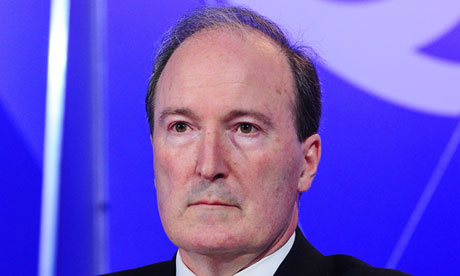
The opening extracts of the long-awaited definitive authorised biography of Margaret Thatcher focus on previously unknown youthful suitors, and details of her childhood. The two-volume biography by Charles Moore, former editor of the Daily Telegraph, is being serialised in that newspaper and – judging by the initial selections – will contain personal as well as political revelations. It also contains accounts of Thatcher's sister and how at school she almost killed some classmates in a scientific experiment that went wrong.
The biography was conceived 16 years ago with some crucial conditions: it was to be published after the former prime minister's death, she would never read it and, importantly, the people who contributed their thoughts and memories knew that. She would never know what they said.
Moore had full access to thousands of pages of Thatcher's private and government papers, early access to documents held back under the 30-year rule and extensive interviews with the woman herself.
Not For Turning, the first of two volumes, will be published on Tuesday. "There's a lot of excitement," said Jon Howells of Waterstones. "People are expecting it to be pretty definitive."
The 800-page book takes readers through her early years and into her first term as prime minister, ending at the October 1982 Downing Street dinner celebrating victory in the Falklands.
The way the book was produced is unprecedented. Thatcher approached Moore in 1997 offering access to herself and her papers, and ruled that it should not be published in her lifetime. In 1998, it was bought for Penguin – for a reported £750,000 – by its then managing director, Andrew Rosenheim, and from then it has incubated, the first volume written and ready to be published once she died.
Stuart Proffitt, a publishing director at the Penguin imprint Allen Lane, said he and his team have not worked on anything else in the last eight days. It went to the printers on Wednesday night, hours after her funeral, and will be available to buy on Tuesday – St George's Day.
But will there be many revelations? Most certainly, said Proffitt. "I edited the two volumes of her autobiography and worked closely with her on those in the early 1990s," he said. "There is a huge amount that is new – the book now makes all other portraits of her look rather two-dimensional.
"Quite apart from the material that is new, it is an exceptional book: simply as a piece of biographical art, I think it is in the very front rank of political biographies of the past 50 years – a very impressive piece of work."
One big question, which cannot be answered until it has been read, is whether Moore, an ardent Thatcher supporter, was ever the right man to write objectively. Can someone so steeped in Tory politics be sufficiently detached?
Certainly Moore, known in Private Eye as Lord Snooty, is as archetypal as they come. In his Who's Who entry he lists hunting as his sole recreation and once entertainingly wrote about the things he has never done: "I have never eaten a product of McDonald's, drunk Coca-Cola, seen The Sound of Music, watched EastEnders or Coronation Street, worn a T-shirt (as an adult), or been to Disneyanything. I have never bought myself any equipment for playing music, or any musical record, CD or tape, never set a video, or attended a professional football, rugby or cricket match, never had a gin and tonic, sewn on a button, lain on a sunbed, carved a joint or changed a wheel."
After Eton and Cambridge, where his friends included Oliver Letwin and the Condé Nast president Nicholas Coleridge, Moore joined the Daily Telegraph aged 22 as political correspondent in the very year Thatcher came to power. Within two years he was writing leaders and in 1984, still in his 20s, he became editor of the Spectator.
Moore returned to newspapers in 1990, editing the Sunday Telegraph from 1992 to 1995 and the Daily Telegraph for eight years until 2003, where he was highly regarded and well liked.
Can he be objective? Even Ken Clarke sounded mildly dubious when both men were on BBC1's Question Time last week. The politician was commenting on how so many of the things being said on the Thatcher years were interpretive, at which point Moore interjected to say we would soon get "history" in the form of his book. "The editor of the Daily Telegraph says his biography is going to be history," said Clarke. "We shall see."
Proffitt hinted that some people might be surprised: "He clearly admires her, but doesn't restrain himself from criticising her when he thinks it's the right thing to do, and the book is remarkably balanced in that respect."
Whatever the reaction the book seems certain to sell well. Priced at £30 – but also available for less, for example £19.20 on Amazon – the book has the second highest biography order from Waterstones this year (after Julian Barnes).
Howells said the Thatcher effect had been felt on the day of her death when sales of her memoirs immediately went up 300% and by the weekend it was in the region of 800%. "There is a big market. Political biographies can be tough and we all know horror stories about political biographies that have underachieved but with someone like Thatcher there has got to be massive interest."
Although the publishers use the American version, authorized not authorised – house style they say – the book will not be published in the US until May. Volume two, called Herself Alone, is still being completed.

